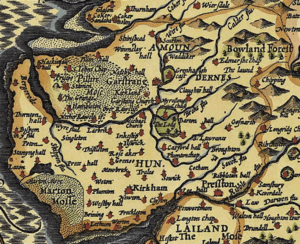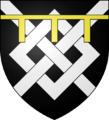James Harrington (Yorkist knight) facts for kids
Quick facts for kids
James Harrington
|
|
|---|---|
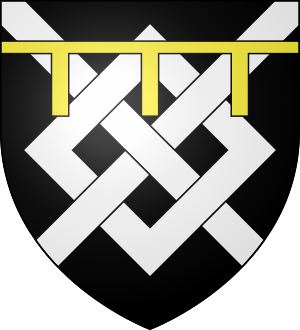
Arms of the Harrington family of Hornby
|
|
| Born | c. 1430 |
| Died | 22 August 1485 Battle of Bosworth Field |
| Spouse(s) | Elizabeth |
| Issue | John (possibly illegitimate) |
| Parents | Sir Thomas Harrington (father) Elizabeth Dacre (mother) |
Sir James Harrington of Hornby (born around 1430 – died 22 August 1485) was an English politician and soldier. He was a strong supporter of the Yorkist side during the Wars of the Roses. This was a series of wars fought in England for the throne. James was especially important in Northern England.
He was the second son of Sir Thomas Harrington. His father died fighting for the Yorkists at the Battle of Wakefield in 1460. James himself fought at the Battle of Blore Heath in 1459. There, he was captured by the Lancastrians (the other side) and held until the next year. He became a key figure during the reign of King Edward IV. Later, he joined the household of King Richard III when Richard became king in 1483. Sir James likely died fighting alongside King Richard at the Battle of Bosworth Field in 1485.
Contents
Sir James Harrington's Early Life and Battles
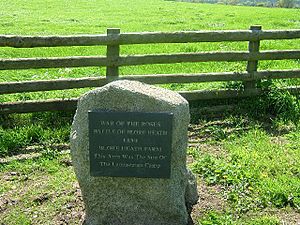
Sir James Harrington's family owned a lot of land in Yorkshire and Lancashire. They were very close to the powerful Neville family. The Nevilles were important Yorkist leaders. James and his father worked closely with them.
In 1459, James was part of the army of Richard Neville, 5th Earl of Salisbury. This army was attacked by the Lancastrians at Blore Heath in Shropshire. The Yorkists won, but James and his father were captured. They were held in Chester Castle. James was set free in March 1460.
Family Losses and Royal Favors
Sadly, James's father and older brother, John, died at the Battle of Wakefield in December 1460. They were fighting alongside Richard, Duke of York. After the Yorkists won the Battle of Towton in 1461, King Edward IV made Sir James a royal official for Yorkshire.
In 1463, James took control of his father's estates. These lands were supposed to go to his father's daughters. This decision led to a long and difficult dispute for James and his family. In 1465, James helped capture the former King Henry VI, who was a fugitive. For this, he received a reward of one hundred pounds.
The Feud Over Hornby Castle
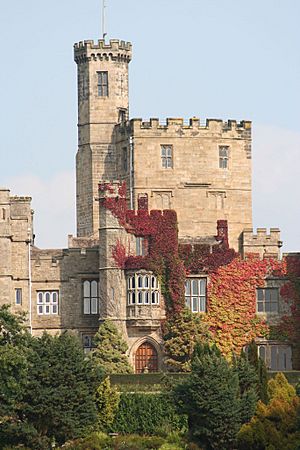
When James's brother, Sir John Harrington, died at Wakefield, he left two young daughters, Elizabeth and Anne. They were only four and five years old. Because they were so young, the king had the right to decide who would look after them and their inheritance. King Edward gave this right to Thomas, Lord Stanley in 1461.
However, James and his brother, Sir Robert, wanted to keep the family's inheritance. They took the two girls and held them. Sir James also took Hornby Castle, which was the main family home. He also took other lands.
Legal Battles and Royal Intervention
The dispute was complicated. Harrington claimed that his father's lands could only be passed down through male family members. Stanley, however, said the lands could be passed through female family members too. In 1466, Stanley was allowed to take the case to the King's Court. In 1468, the court decided against Harrington. James and his brother were briefly sent to prison.
The political problems between King Edward and the Earl of Warwick paused the legal case. During a time when King Henry VI briefly returned to power in 1470, the Harringtons held Hornby Castle against Stanley. Stanley had not been able to take control of it yet.
When King Edward IV returned from exile in 1471, Harrington was one of the first northern knights to join him. He brought 600 soldiers to help the king. After Edward won important battles, the case was heard again in 1472. King Edward himself stepped in and ordered a settlement.
Holding On and Royal Favor
Even though the king decided in Stanley's favor, Harrington did not give up Hornby Castle easily. He filled it with men and supplies for war. The Harringtons still held the castle in 1473. King Edward had to send his Sheriff to tell them their actions were against the law.
Eventually, they had to give Hornby Castle to Edward Stanley. However, they were allowed to keep some other lands. Harrington remained in the King's favor. He joined King Edward on his trip to France in 1475, bringing many soldiers. He was also appointed to a local government position in Yorkshire. This shows that the King still trusted him as a loyal supporter.
Stanley, who now had control of the girls, quickly married them off to his relatives. For example, Anne married his son, Edward.
Sir James Harrington's Connection to Richard III
Sir James Harrington had a strong connection with Richard, Duke of Gloucester (who later became King Richard III). Richard helped James in his dispute with Stanley. In 1469, Richard was made chief forester of certain areas, and Harrington became his deputy.
Harrington became a member of Richard's personal council. This meant he was close to the future king. He also served with Richard in military campaigns near the Scottish border in 1480 and 1482. When Richard became king in 1483, it gave the Harringtons a chance to try and win back their inheritance. They were very loyal to Richard. James's brother, Robert, was even involved in the arrest of a powerful lord named William Hastings in 1483. In 1485, James was made chief forester of Bowland.
The Death of Sir James Harrington
Sir James Harrington is not directly mentioned by writers at the time as being at the Battle of Bosworth Field on 22 August 1485. This has made some historians wonder if he survived. However, the Harrington family tradition says he died there. A later poem about the battle also claims he brought many northern knights to the fight.
What we do know is that he was not included in the general pardon given in 1486. He was also declared a traitor in 1487. After this, his name disappears from official records. As a "Knight of the Body" and a member of the King's Household, it is very likely that Sir James Harrington was with King Richard III during his final charge at Bosworth. He might even have carried the king's flag. If he did survive the battle, he likely died soon after, perhaps by 1488. His family lost its power after his death.
Sir James Harrington's Family
Sir James Harrington had a son named John, who may have been born outside of marriage. James made John his heir before going on a military campaign in 1480. King Richard III later made John an esquire in his household.
After the Battle of Bosworth, James's widow, Elizabeth, wrote that she believed John had been poisoned. This might have happened shortly after the battle. It is thought that Edward Stanley, who received James's lands after James was declared a traitor, wanted to make sure John could not try to get the lands back.
It's interesting to note that Sir James Harrington and Thomas Stanley, with whom he had such a big feud, were actually cousins!
Sir James Harrington's Important Roles
Sir James Harrington held several important positions during his life:
- High Sheriff of Lancashire: 1466-1467 and 1475-1476
- Steward of Bradford: 1471
- MP for Blackburn: 1467-1468 and 1478
- Knight of the Body (a personal attendant to the King) for Edward IV from 1475, and for Richard III when he became king
- Vice-constable of England: 1482
Images for kids
 | Ernest Everett Just |
 | Mary Jackson |
 | Emmett Chappelle |
 | Marie Maynard Daly |


